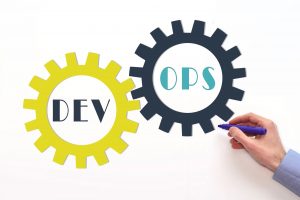
Here’s Why You Need a DevOps Engineer
Posted by Walid Abou-Halloun Date: Sep 19, 2022 3:10:05 PM
Have you considered moving into DevOps? If not, then it is high time that you do.
A whitepaper revealed that 60% of companies have moved to DevOps or plan to do so in the future.
Server operating systems, as we know them, are also dying. Matter of fact, Amazon discovered that as well, as they observed that 40% of their server capacity was wasted. Within a year of transition to the cloud, their DevOps engineer was deploying code every 11.7 seconds.
Many other companies have also made the shift to see phenomenal results.
Thus, DevOps is the future of tech. Because of this fact, your enterprise will need a DevOps engineer. Here’s your guide to this role and why you need one.
What is a DevOps Engineer?
Among the many technology trends for 2018, DevOps is one of the biggest and most important. Every business needs DevOps if they want a productive, efficient, and positive workplace.
A DevOps engineer is basically an information technologist. What makes them especially suited to DevOps is that they work with system operators, software developers, and IT staff to supervise code releases.
Here are some of the skills they possess.
System Administrator Capabilities
System administrators create, manage, supervise, and troubleshoot servers. A DevOps engineer serves a dual role in not just having the servers work the way they should, but also automate key processes in deploying the infrastructure and the server.
Handling of Virtualisation
The DevOps engineer should know how to virtualise the servers, which means masking the server from users and partitioning it into smaller components, among other functions.
Irrespective of whether this is a private or public cloud, they should be comfortable with handling virtualisation.
Experience in Network and Storage
A DevOps engineer should be able to design solutions for any network, regardless of scalability and performance. They should also be able to deploy storage options.
And, they must have some experience doing it. The DevOps professional should also be able to manage data and use open source technologies and tools.
Coding Knowledge
With the rise of automation, IT is set to lose a few jobs, but coding and scripting are one of those skills that will survive in the long run.
A good DevOps engineer can code in any popular language, like Pearl, Python, Java or Ruby. With this skill, a DevOps engineer can be a bridge between the systems teams and the developer teams.
Excellent Soft Skills
In order to interact with all these other teams, the DevOps engineer needs to have great soft skills and people skills. This is a major culture shift as developer teams and systems teams have long been working independently of each other.
DevOps people should be comfortable collaborating, communicating, and reaching across functional limits.
Background in Automation Tools
The DevOps process involves using plenty of automation tools and technology, including some that are widely used like Salt, Chef, Puppet, Ansible, Docker, cloud computing, coding, and storage platforms.
A proficient DevOps engineer will have a strong grasp of some or all these tools.
Understanding of Cybersecurity
Security is a major focus in the DevOps domain. In order to ensure all systems are running without a hiccup and are safe, the DevOps automate security, which leads to faster updates, and an agile system with increased visibility.
Testing and Troubleshooting
DevOps engineers not only deploy systems but anticipate problems by frequently testing. It’s not about the reaction but prevention of system failures, software breaches, and breakdowns.
Business Orientation
Another skill that the DevOps engineer possesses is the ability to focus on the business outcome. He or she can bridge the technical and business goals of a company.
DevOps engineers are an elite group of IT professionals who stitch programs together for businesses based on your specific needs. This means that they’ve adapted to the sweeping change in the software development world.
The software itself is an evolving animal where Omni channel interface has become compulsory and code must change to suit the needs of the fast-paced business environment. As a result, testing and deploying of systems is also changing in terms of protocol and management.
Tools of a DevOps Engineer
Some of the tools that DevOps professionals use are containerisation such as Docker and LXD, orchestration tools like Kubernetes and Mesos, and source control tools such as Git and Bitbucket.
There are also configuration management tools like Jenkins and Puppet, and cloud software tools such as AWS and Azure, which come in handy.
The Role of a DevOps Engineer
Let’s delve deeper into what the role of a DevOps engineer is.
DevOps requires frequent and incremental testing and deployment of code versions. Though they may not do it from scratch always, they need to be in the know about it.
They must connect all the elements of the code with libraries and other software developing kits.
Their role would also involve connecting elements of the code with SQL data management and messaging tools that run software releases on operating systems and other production infrastructure.
The DevOps professional must also be accustomed to a multi-tenant environment, that the supported software code is dedicated to and must manage the IT infrastructure according to the software’s requirement.
They also validate and monitor the performance. They decide what resources will be required and which deployment model is appropriate. They do this smoothly by working with the team.
Who are these DevOps Engineers?
You must know that there is no specific training for DevOps professionals.
They are thus people with considerable experience in the IT field. Some of them are developers who have transitioned into operations. Others could be system administrators who have learned and matured in the coding domain.
This is also not every IT professionals’ cup of tea. It’s a cross-functional profession that has massive responsibilities and is seeing an upsurge in demand thanks to the way software development now takes shapes.
Why do you need a DevOps Engineer?
A DevOps professional can be a fantastic addition to your IT team for the following reasons.
1. They Help You Fulfill Broader Business Goals
DevOps engineers are not just ordinary IT guys. They are programmers and system administrators who bring far more to the team than just IT skills.
Their resume is a testament to being proficient developers and master communicator across departments, functions, and processes.
They are quick on their feet and capable of reaching decisions quickly based on their vast experience.
That translates to a programmer whose expertise enables him to look at the bigger picture. This means that they look at your broader goals as a business instead of strings of code and smaller functions.
2. They Provide Automation Solutions to Your Business
The vast majority of the IT industry is afraid of automation. But DevOps engineers embrace automation.
To meet the necessary standards of quality in code matches, they make the most of this. By successfully incorporating automation tools, they spend little time on small programming tasks that can be easily handled through automation.
With automation tools like Puppet and Ansible, they perform IT tasks faster and simpler issues are taken care of while challenging issues are given adequate time to be studied, tested, and readied for deployment.
Through automation, they also ensure that no human resources are being spent on repetitive tasks and human error is minimised.
3. They Can Be a Programming Bonus
At the heart of it, the DevOps engineer is still an effective coder. Consider them as extra programmers for your IT team. Only, they’re much better given the extra skills that you won’t find in just a developer or an administrator.
Thus, if there’s an extra task of coding or scripting, a DevOps engineer can be the eleventh man, contributing to get the job done.
4. They Get Work Done Faster
The DevOps engineers, being familiar with automation, tend to quicken the smaller, menial programming and operating tasks. They won’t get into the basics of managing passwords, usernames, and email settings. Manual monitoring will thus become a thing of the past.
So, more time can be allocated to mission-critical codes and software delivery. It will also speed up the system and make your business more efficient.
5. They Deliver Consistent Results
This is one of the best reasons why you hire DevOps professionals—the reliability and consistency.
Since they are aligned with your broader business goals, speed up your processes, automate the backend, and provide expert support, they ensure that your company delivers to its customers consistently and reliably.
By communicating across departments, they help your IT teams and developers all have the same general vision. This translates to better software development and increased business for your brand, keeping your business sharp and safe in a volatile business market.
DevOps is a journey and yours can begin by studying your current business practices and delivery pipelines. By identifying clear objectives, your DevOps strategy must be devised to achieve them effectively.
Wrapping Up
The old ways of software development have gone, and a new breed of all-round IT professionals have replaced them. They’re known as DevOps professionals.
Have you considered adding a DevOps engineer to your team? If you have any questions about DevOps infrastructure and resources, contact us and we will be glad to help.




